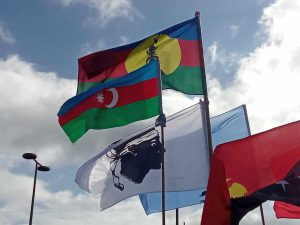As a voting reform bill sparked riots that ripped through New Caledonia, the French special collectivity in Oceania, Paris suspected foreign interference was at play. But the source was a surprise to many. “I regret that some of the separatists have made a deal,” Interior Minister Gerald Darmanin stated, “with Azerbaijan.”
Video had emerged of protesters in New Caledonia waving Azerbaijani flags before posters of Azerbaijani President Ilham Aliyev. While Azerbaijan pointedly denied the allegations, supporting separatism in France’s overseas territories has become a top priority of Aliyev in his role as chair of the Non-Aligned Movement (NAM).
Having successfully stared down Russia in the conflict with Armenia, Aliyev now seeks to punish France for its longtime sympathy for Yerevan. The initiative is part of a newly bellicose approach to foreign policy, projecting an image of a leader that can stand toe-to-toe with regional powers and superpowers alike.
In 2020, Azerbaijan dealt a decisive blow to Armenia in the largest flare up of a three decade old conflict over Nagorno-Karabakh, a separatist region of Azerbaijan populated mainly by ethnic Armenians. The OSCE Minsk Group, composed of the United States, Russia, and France had brokered a ceasefire agreement with Russian troops deployed to keep the peace. But two years later, Russia was mired in Ukraine and its inability to take Kyiv had shattered its aura of invincibility. Azerbaijan tested Russian resolve, demanding its peacekeepers leave. Russia issued mealy mouth calls to respect previous agreements before folding, allowing Azerbaijan to begin a siege that would lead to the dissolution of the breakaway republic and the flight of over 100,000 Armenians.
Azerbaijan had long disdained France’s position in the Minsk Group for its perceived pro-Armenian bias. Foreign Minister Jeyhun Bayramov stated Paris was incapable of acting as an “honest broker” after the 2020 war. Azerbaijan’s legislature called for France’s expulsion from the mediation group.
As Azerbaijan began demanding the evacuation of Russian peacekeepers in 2022, France condemned the actions while the French Senate passed a nonbinding resolution supporting sanctions against Azerbaijan. Baku blasted the move as “reflecting slander and false judgments entirely removed from reality.”
Aliyev would thereafter dedicate his chairmanship of the Non-Aligned Movement to punishing Paris. When he took the stage to speak before the Contact Group of NAM about COVID-19 in March 2023, he instead railed against France and demanded an apology for its colonial past and “acts of genocide.” He called France’s overseas territories – and specifically New Caledonia – “nasty remains of the French colonial empire.”
Aliyev welcomed to Baku separatists from New Caledonia, whom Azerbaijani media lauded as “freedom fighters” aiming to “rid New Caledonia of French colonialism.”
At the NAM ministerial summit in July, the multilateral body announced the formation of the “Baku Initiative Group against French colonialism.” At the conference, Roch Wamytan, head of New Caledonia’s Congress and a member of the separatist party, asserted that Azerbaijan has the right to “help with the decolonization process” in New Caledonia.
By November of last year, Azerbaijan’s fulsome support for the separatists had reached the island, and pro-regime media gushed over the presence of Azerbaijani flags flying at a New Caledonian separatist rally. One pro-regime outlet declared, “Azerbaijan, as chairman of the Non-Aligned Movement, pays special attention to the fight against the neo-colonialism of France and exposes this country in the international arena.”
When riots erupted in New Caledonia earlier this month, Azerbaijani state-owned outlet ITV, in consecutive videos, celebrated the presence of Azerbaijani flags at the separatist rallies then accused France of making “incredible accusations” about Azerbaijani influence. An editorial in a leading newspaper captured the logic of Azerbaijani support for the riots: “It should be remembered that when Azerbaijani lands were occupied by Armenians… the French government accused Azerbaijan of aggression instead of Armenia, and … interfer[ed] in the internal affairs of the South Caucasus region.”
Aliyev’s gamble that France will decline retaliation is not without risk. French energy behemoth Total plays a crucial role in the Azerbaijani oil and gas sector, both in extraction and transit. But with Europe desperate for non-Russian sources of oil, and pipelines that circumvent Russia, Paris may find that a meaningful economic response is not worth the cost.
Aliyev has crafted an image of himself as a conquering strongman, having stared down Russia, attacked its treaty ally, and won vast territories with few consequences for his provocations. An independent New Caledonia indebted to Azerbaijan may be a long shot. But showing the Azerbaijani people – as well as neighbors – that Aliyev can dictate terms to superpowers who will only issue toothless complaints in return is enough of a victory.

































